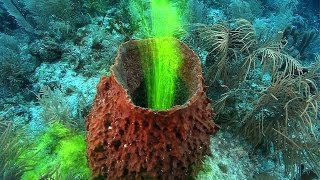Coming up next on Jonathan Bird's Blue World, Jonathan explores the biology of sponges, and you might be surprised at what he finds!
接下来请收看乔纳森·伯德的《蓝色世界》, 乔纳森·伯德将探索海绵动物的生理,你可能会对他的发现感到惊讶!
Hi, I'm Jonathan Bird and welcome to my world!
嗨,我是乔纳森·伯德,欢迎来到我的世界!
When people think of a sponge, they usually imagine something like this: a cleaning sponge for washing the dishes…or for washing the car.
当人们想到海绵动物时,他们通常会想到这样的东西:用来洗碗或者洗车的清洁海绵。
Cleaning sponges are synthetic these days, but they used to come from the ocean.
如今,清洁海绵是人工合成物,但它们过去取自海洋。
Back in the days before we had synthetic sponges for housework, cleaning sponges did come from the ocean.
在我们使用人工合成物制成的海绵做家务之前,清洁用海绵确实来自海洋。
They were harvested by hard-hat divers walking along the ocean floor in heavy weighted boots with a rake-like tool to pluck the sponges off the bottom.
戴安全帽的潜水员穿着沉重的靴子,用类似耙子的工具沿着海底行走,将海绵从海底拔出。
It was a dangerous and difficult job.
这是一项危险又困难的工作。
Bagfuls of sponges were lifted to the boat above.
一袋袋的海绵被抬到上面的船上。
Immediately, the crew set to work cleaning the sponges.
船员们立即开始清理海绵。
Then they were hung to air dry.
然后再把它们晾干。
After days or weeks at sea, when the boat was full of sponges, they were taken to shore, where they were auctioned to the highest bidder.
在海上航行了几天或几周后,船上装满海绵时,船员们就把它们带上岸,卖给出价最高的人。
Finally they were trimmed, sorted and sold to the public.
最后,经过修剪、分类后,卖给公众。
Natural sponges are still harvested in nearly the same way today, but the synthetic sponge has spared the lives of countless ocean sponges!
今天,几乎还是用同样的方法获取天然海绵,但合成物制成的海绵却挽救了无数生活在海洋中的海绵动物的生命!
While an ocean sponge looks something like a weird plant, it's actually an animal.
虽然海绵看起来像一种奇怪的植物,但它实际上是一种动物。
In fact, sponges are among the simplest multi-cellular animals on Earth.
事实上,海绵是地球上最简单的一种多细胞动物。
They live on the bottom of the ocean, attached to a surface and never moving because they can't walk or swim.
它们生活在海底,附着在表面,由于不能行走或游泳,所以从来都不移动。

Some are quite colorful, while others are drab.
有些海绵颜色鲜艳,有些则是单调的颜色。
They also come in all shapes and sizes.
它们的形状和大小也各不相同。
There are tube sponges, vase sponges, barrel sponges, rope sponges, encrusting sponges and many other types.
有管状海绵、花瓶状海绵、桶状海绵、绳状海绵、包壳海绵和许多其他类型的海绵动物。
Sponges live from the frigid waters of the arctic and Antarctic, to the tropics.
海绵从南北极的寒冷水域,到热带地区都可以生活。
On many coral reefs, sponges dominate the sea floor and the drop off.
在许多珊瑚礁上,海绵动物主宰着海底空间。
One of the most common sponges on coral reefs is the barrel sponge.
珊瑚礁上最常见的一种海绵是桶状海绵。
Barrel sponges grow to epic proportions, getting larger than a person!
桶状海绵能长得非常高,比人的个头还大!
Although sponges can't walk or swim, they can feed.
虽然海绵不能走路或游泳,但它们可以进食。
They do it by filtering tiny plankton from the water.
他们通过过滤水中的微小浮游生物来进食。
A sponge is covered with small pores, called ostia, which lead to a system of internal canals and eventually out to one or more larger holes, called oscula.
海绵上覆盖着许多称为口的小毛孔,口连接到一个内管系统,最后延伸到一个或多个更大的孔,叫做出水孔。
Within the canals of the sponge, chambers are lined with specialized cells called choanocytes, or collar cells.
在海绵体内的管道中,腔室里排列着称为软骨细胞的特殊细胞。
The collar cells have a sticky, funnel shaped collar and a hairlike whip, called a flagellum.
项圈细胞带有一个粘性的漏斗状项圈和一个被称为鞭毛的毛鞭。
The collar cells serve two purposes.
襟细胞有两个作用。
First, they beat their flagella back and forth like fans to move water through the sponge.
首先,它们像扇子一样来回拍打鞭毛,使水通过海绵。
The water brings in nutrients and oxygen, while it carries out waste and carbon dioxide.
水带来营养和氧气,同时产生废物和二氧化碳。
Second, the sticky collars of the collar cells pick up tiny bits of planktonic food brought in with the water.
第二,襟细胞黏稠的项圈可以捕获到水中的微小浮游生物,以此作为食物。


